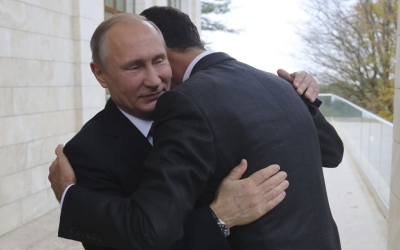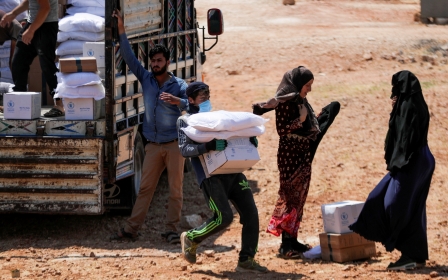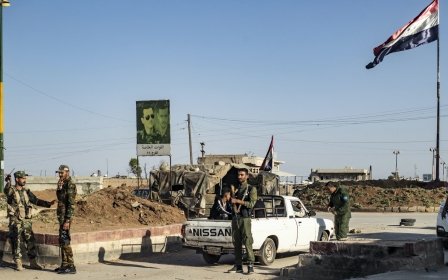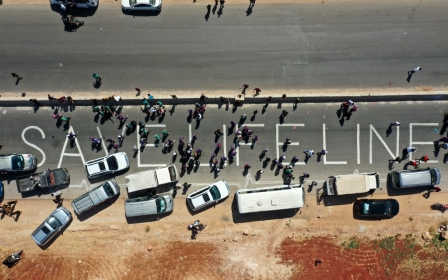Syria: Russian-backed air strikes in Idlib leave families traumatised after losing loved ones
"It is a month of grief, I have lost 10 members of my family, including my father, brother and sister," Hasan al-Assi, a father of three from Syria's Idlib, said days after Russian-backed bombardment of his town killed his relatives in a series of attacks since June.
The air strikes by the armed forces of the Russia-backed government of President Bashar al-Assad have hit several locations of the Jabal al-Zawiya district in southern Idlib, resulting in an unprecedented number of casualties since a ceasefire between Turkey and Russia came into effect in March 2020.
According to the UK-based Syria Observatory for Human Rights, air strikes last week killed at least eight civilians, including six children in three villages in Jabal al-Zawiya- Iblin, Balyun and Balshun.
"There are no words to describe what happened to my family in the last period," said Assi, who said he witnessed "two massacres" committed against members of his family in less than a month.
Assi and his family were displaced early last year to the Syrian-Turkish border following the military operation carried out by the Assad government on the southern and western countryside of Idlib, before returning to their homes due to the high cost of living and overcrowded camps of displaced persons.
"On 10 June, I was at a family gathering in Iblin village when the first shell fell on the house, but no one was hurt," he told Middle East Eye.
"While we were trying to evacuate the house, the second shell fell in its vicinity, killing 13 people, including six members of my family: my little brother Abdullah, my father Mohammad, my sister Walaa, her son Waled and two of my cousins," he said.
Twenty-two days later, Assi woke up to another tragedy. This time, another shelling killed his uncle, aunt and three of their children.
"On 3 July, the regime forces targeted the house of my uncle Subhi al-Assi with a laser-guided artillery shell in Iblin village. He was a volunteer in the medical team in the Violet organisation.
Translation: A photo from Jabal al-Zawiya, an entire family lost their lives due to Russian artillery shelling.
Violet mourned its volunteer Subhi, and called on the international community and human rights groups to put pressure on the Syrian government and Russia to stop the bombing and the direct targeting of civilians in northwest Syria, which is causing a new wave of displacement to the camps, which lack the minimum necessities of life.
Assi told MEE that, after the recent bombing campaign on his family's homes, people were forced again to flee towards northern Syria, especially women and children, while a number of the family's men remained in the town to continue work on their agricultural lands.
"This time, the surviving members of our family left the village for the Syrian-Turkish border, while the rest left to heaven."
Rescue worker loses two daughters
On the same morning of the attack that killed Assi's uncle, another air strike targeted the nearby Balyun village.
Omar Muhammad Khair al-Omar, a volunteer with Syrian Civil Defence (also known as the White Helmets), lost two of his daughters as a result of a double bombing of his house.
"I lost two angels who filled my house with love and tenderness," he told MEE, referring to his 14-year old and seven-year-old daughters.
'I lost two angels who filled my house with love and tenderness'
- Omar Khair al-Omar, White Helmets
"During my work with the White Helmets, I saved many lives from death, but death this time was faster than me. It kidnapped my daughters."
Omar said he was sitting after dawn with his wife on the house balcony, and there were sounds of shells falling on nearby villages, which made his son wake up frightened and come to sit with them.
"At six o'clock I heard the sound of a shell being fired, and I waited to see where it would fall. After three seconds I felt that something had fallen inside the house, and a split second later my house exploded, and stones started falling on my head," Omar said.
“I rushed to take my wife and child who were with me out of the house, and I came back to search for my daughters in the dust, as I could hardly see in front of me."
After few minutes he found his 14-year-old daughter Iman under the roof of his house covered in her blood. He quickly pulled her out with the help of his colleagues from the Civil Defence who rushed to the area, but she had already passed away.
"We started looking for my little daughter Noor, but we couldn't find her. We heard the observatory say that another shell was fired towards the area, so we ran away from the house, and the shell fell again on my house," he added.
"We came back shortly to look for my daughter Noor and found her lying on the ground near the house."
According to the Civil Defence, 192 attacks were launched by the forces of the government and Russia during June and the first week of July, in a new escalation campaign on the southern Idlib countryside and northern and western Hama countryside.
The bombings killed 54 civilians, including 11 children and 10 women, and wounded more than 148 others.
Musa Zidane, an Civil Defence media coordinator, told MEE that within a month, two SCD centres were targeted, which caused them to suspend their service, while a volunteer was killed and eight others were wounded.
Middle East Eye propose une couverture et une analyse indépendantes et incomparables du Moyen-Orient, de l’Afrique du Nord et d’autres régions du monde. Pour en savoir plus sur la reprise de ce contenu et les frais qui s’appliquent, veuillez remplir ce formulaire [en anglais]. Pour en savoir plus sur MEE, cliquez ici [en anglais].






